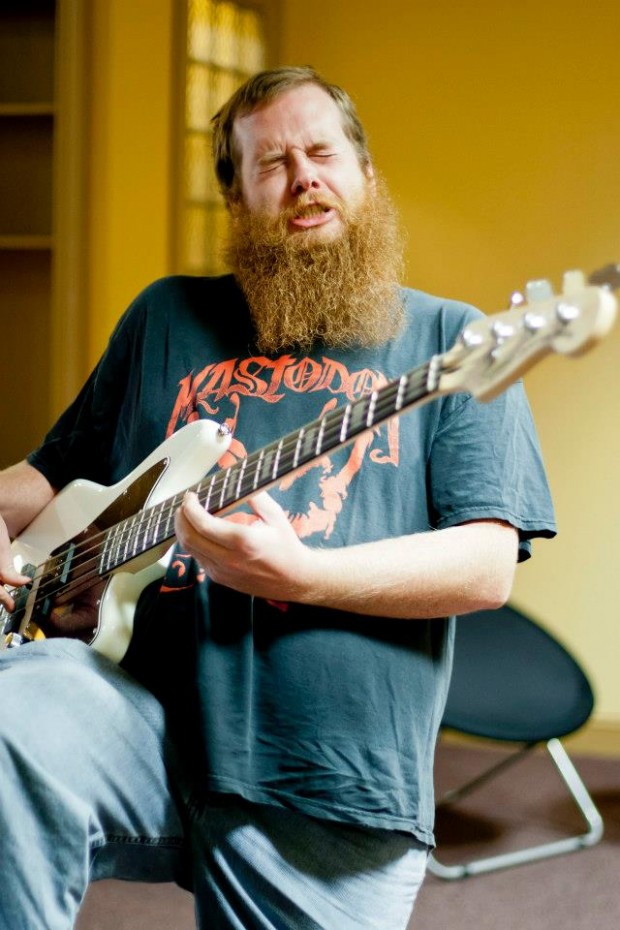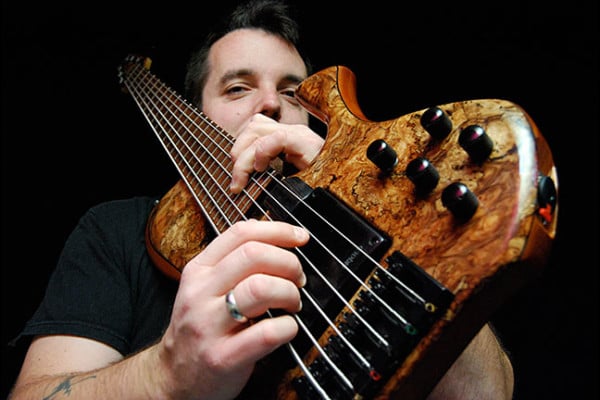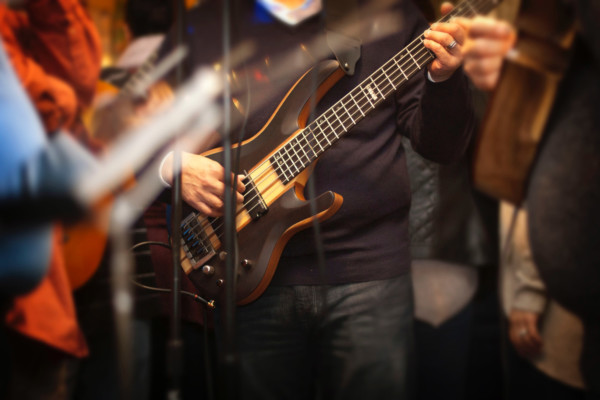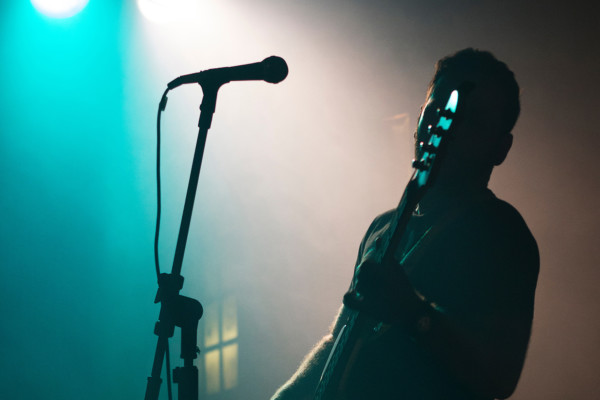Musical Growth: Finding Those “Aha” Moments

Q: What were some of the breakthroughs or “aha” moments in your bass playing? Specifically, what are some of the things you’ve learned that unlocked a higher level of knowledge and technique?
A: That’s an interesting question… and the answer tends to be different for everyone.
Everyone learns differently and is likely to have different epiphanies and realizations come to life in any number of ways.
For me, there is only one moment that stands out as a honest-to-goodness “aha” moment, and it has more to do with fear-based playing and perspective.
My entire developmental musical life (up until my twenties), I was a drummer who played bass. When I switched majors at Berklee from Drum Performance to Bass Performance, it was equally exciting as it was terrifying. I had some dexterity, knew my scales and could read well, but I had never played bass with other people. It was something I did in my bedroom since I was about six years old, minus a seven year break when I got really serious about my drumming.
I didn’t know blues changes, I didn’t know how to develop my own lines, navigate chord charts… I didn’t know anything but reading transcriptions and playing along with recordings.
Because of this (somewhat backwards) approach to learning to be a good bass player, I developed a fear of messing up the harmony – something that I never had to worry about as a metal drummer – a fear of bad solos, a fear of not cutting it in any which way.
This served to motivate me to work hard but unfortunately, the fear never left, even after I had quit my day job and was a bonafide “working musician”!
My “aha!” moment came to me while playing a restaurant trio gig in Lake Oswego, Oregon, only about eight or nine years ago and this moment was the thing that elevated my playing from “good” to “wow, he really has something special” – most of the time, anyway – in the eyes and ears of my peers.
I spent the first set feeling okay about my walking lines, but with every solo (and there was one on just about every tune) I couldn’t help feeling self-conscious and hyper-aware of the fact that this traditional jazz was a) not my first language and b) something that sounded best on an upright and not an electric 6-string bass.
I felt like I was using the wrong tool for the job and as a result, I hated every single thing I played. By the end of the first set, I was dejected, angry and feeling like a waste of musical space.
I sat at the bar during the set break alone, nursing a Coke (I don’t drink alcohol), beating myself up and looking around when I had a thought that went something like this:
“Wait… I’m sitting here in a small Italian restaurant, playing standards for a bunch of people who are more interested in their mediocre pasta, beating myself up because I can’t play like Christian McBride. Who said I need to play like Christian McBride here? Just stop being such a neurotic, hyper-self-conscious ninny and have fun. Nobody cares! It’s only music… what’s the big deal? Do your thing with the tunes and screw ’em if they don’t like it. Be yourself and have fun!”
I paraphrase… but that was the crux. I realized that I’m playing music with people who are having fun and the only thing that was stopping me from enjoying it was a weird expectation I put on myself – to sound like someone else.
Music has no real rules aside from it being considered “good” when people like it. So you might as well have fun with it. It certainly couldn’t be any worse than what I was doing to the music at that point.
So the second set was a musical realization for me. I abandoned the “think like a jazz guy… think like a jazz guy… play a bebop line… what would a horn player play here?… Damn, I started that lick from the root again.. I’m such a lame soloist!” torture I was putting myself through and simply said, “play with those changes and have fun! Walk hard through those changes and play what comes to mind… now take it where you feel it going. I’m abandoning those changes? eh, who cares, just resolve it one the next system… Ah nice! That was actually kinda neat!”
The second set sounded immensely better to my ears, and I actually wound up getting massive compliments from the other guys in the group. Not because of my Chris Potter-like soloing but instead because I was playing with intention, intensity and interpreting the music in the moment. I was having fun and making music. I wasn’t trying to play it.
From that moment on (and it is still is a struggle at times), I’ve sounded better and played better simply because I put everything I’ve got into making music and interacting with it instead of trying to play what I think people want to hear.
It’s astounding, really. As soon as I stopped caring about people’s impression of me as a “jazz guy” and starting playing the music as best as I could, in the way that I do, I immediately became an infinitely better “jazz guy”.
Now, this is not an invitation to get too “wanky” or abandon changes. I’ve met a lot of players who take the “there are no wrong notes” a little too much to heart. You’ve still gotta play the tune and make it sing! It’s not an excuse to stop working on your ability to play over changes but rather, an invitation to more fully explore what you have to say over those changes, regardless of what others have said before you.
The world has already heard Coltrane play over “Giant Steps”, so why bother trying to recreate it? It may be a good exercise in the shed, and it is a challenging approach but in the end, people want to hear your interpretation of the tune. If I’m feeling a rhythmic groove solo, I’ll take one. Follow your heart and ears and the music usually takes care of itself.
Sure, sometimes something might not work but people still appreciate the intention. A more recent example comes from a gig I had at a big jazz festival with some guys I hadn’t played with in a long time. There was also a special guest and a substitute drummer in the band who wasn’t all that familiar with the material. The sound was bad and most of us couldn’t hear the rest of the band.
By my standards, the gig kind of sucked. I didn’t play nearly as well as I wanted, and there was a lot of miscommunication on the stage. Tunes were called that I’d never even heard (with no charts) and I left feeling annoyed and bummed that I hadn’t played better. I was mostly bummed that I played poorly for the guys on stage, because I have a lot of respect for these guys.
I waited a bit and then wrote an email to apologize to the band leader – without making excuses – for not playing as well as I had wanted. His response was this:
“Man, forget it. that was a tough gig and we hadn’t hit it in a while. I will always love playing with you because you are always in the moment and play with such conviction! It’s always a pleasure”.
That is what it’s all about, my friends!
How about you? What has been your “aha” moment, musically speaking? Tell us about it in the comments.
Have a question for Damian Erskine? Send it to [email protected]. Check out Damian’s instructional books, Right Hand Drive and The Improviser’s Path.




Excellent advice Damian – the worst I’ve ever played is when I’ve TRIED to play my best, instead of simply being in the moment and enjoying myself.
Still waiting for it after 40+ years!!
Spot on ! I had it once maybe twelve years ago, when I had the chance to play with my favorite drummer in my town during a jam session in a club, I just tried to enjoy the moment because it was so rare to play with him !
(this guy –> http://www.youtube.com/watch?v=m5N_VrqxosY )
Yet another good point well made.
Great article – but I still do find it hard to stay positive when u feel u aren’t playing well during a performance.. esp when u get lost during a song..
I had the same experience. That moment freed me to play and have fun with the music instead of trying to play music. It freed me to be in that moment and it translates to whatever genre I happen to be playing. Fear is just in the mind and when you are there, you are not in the moment.
I had a similar moment. I just decidet, not to play it note for nore, because it was heard in this version before. I give all my heart into the music, and the bands I play with tend to sound a bit more “heavy”, but people like it that way. This is why people like playing with me.